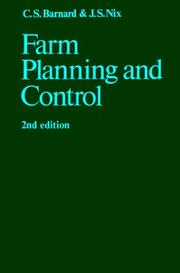| Listing 1 - 1 of 1 |
Sort by
|

ISBN: 0521296048 0521226589 0511559917 9780521226585 9780521296045 Year: 1979 Publisher: Cambridge: Cambridge university press,
Abstract | Keywords | Export | Availability | Bookmark
 Loading...
Loading...Choose an application
- Reference Manager
- EndNote
- RefWorks (Direct export to RefWorks)
Although there are many motives for farming, the achievement of a worthwhile financial return, coupled with a good standard of living, ranks high among them. This implies the need for sound business organisation - the more so as holdings become larger, more specialised and more capital intensive. The present book offers a comprehensive treatment of farm business organisation and control. Although designed primarily as an intermediate text for students in universities and agricultural colleges, it is of interest and value to all those concerned with farm business, including business advisers, land agents, accountants and bank managers. The book's wide coverage is made possible by a mainly non-mathematical presentation coupled with a liberal use of examples drawn from farming practice. The book is divided into four parts: the organisation of resources, the organisation of enterprises, the combination of enterprises and the control of resources and enterprises. The overtaking theme is that, in order to make the most economic use of the resources at his disposal, the farmer has to decide what resources to use, how to organise their use within individual enterprises and how to combine the enterprises into an integrated farming system. Lastly, if these efforts are not to be largely wasted, he must initiate the keeping of suitable records to provide both planning data and a system of checks and controls when his plans are put into practice.
Farm management. --- Farm management --- Business, Economy and Management --- Economics --- Farm management - Great Britain. --- Farm organization --- Farms --- Agriculture --- Land tenure --- Management --- Agricultural landscape management --- Agricultural systems --- Economic aspects
| Listing 1 - 1 of 1 |
Sort by
|

 Search
Search Feedback
Feedback About UniCat
About UniCat  Help
Help News
News